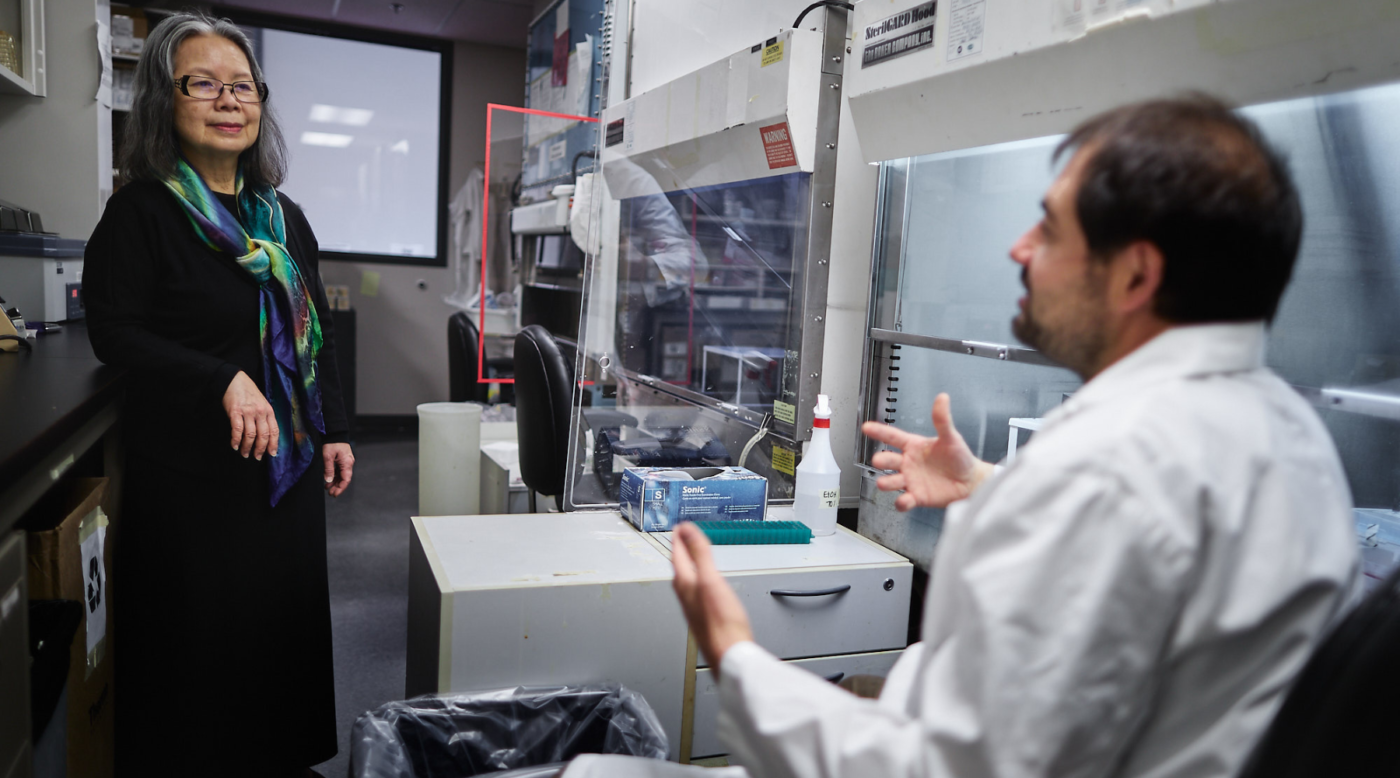News
Hyperactivation of the NOTCH1 pathway in T-cell acute lymphoblastic leukemia: two recent publications bring new insights
Published on June 27, 2022
T-cell acute lymphoblastic leukemia (T-ALL) is an aggressive form of leukemia that requires intensive chemotherapy treatments. In affected individuals, thymocytes (immature T lymphocytes) proliferate uncontrollably and invade the blood system, interfering with its normal functions. At the molecular level, recurrent mutations affecting genes determining the cell fate favor the development of T-ALL. Among the factors identified, NOTCH1 is the most frequently mutated one, in both children and adults with T-ALL. A gain of function of NOTCH1 activates different signaling pathways supporting the growth, proliferation and survival of leukemic cells. Given its central role in the development of T-ALL, targeting NOTCH1 and its effectors is a promising therapeutic approach.
The team of Trang Hoang, director of the Hematopoiesis and Leukemia Research Unit at IRIC, focused on the hyperactivation of NOTCH1 in T-ALL. The work of Diogo Veiga, postdoctoral fellow now professor of Genomics and Bioinformatics at the Universidade Estadual de Campinas in Brazil, and Mathieu Tremblay, research advisor, has led to the publication of two articles.
“Diogo and Mathieu have a lot of talent. Diogo is a bioinformatician with a penchant for immunology and Mathieu is a molecular biologist with a penchant for genetics and leukemia. Their complementarity reflects what the one we find at IRIC!” – Trang Hoang.
A tumor suppressor role for HEB identified by bioinformatics and proteomic analyzes
The fact that approximately one-third of T-ALL cases do not involve any alteration of the NOTCH1 gene suggests that other pathways are involved in the development of the pathology. The massive functional genomics data that are publicly available were judiciously analyzed by Diogo Veiga in a bioinformatics way, generating new hypotheses that were then thoroughly discussed and rigorously tested by Mathieu Tremblay and the other members of the team. This is how the Hoang laboratory identified the primordial role of the HEB transcription factor in the development of T-ALL. Their study, published in Frontiers in Immunology, reveals a tumor suppressor role for HEB, which works by inhibiting NOTCH1-induced pre-leukemic stem cell proliferation and T-ALL progression.
Unlike conventional tumor suppressors, it is not the alteration of the HEB gene that promotes the development of T-ALL. The team’s results show that the loss of function of HEB is rather controlled at the protein level, revealing a distinctive mechanism that is difficult to identify by large-scale genomic analyses. These results underline the need to integrate multidisciplinary approaches for the study of cancers.
Targeting metabolic pathways downstream of NOTCH1 to improve treatments
The development of NOTCH1 inhibitors is complicated by the acquisition of resistance and poor tolerance. An alternative approach would be to target metabolic pathways downstream of NOTCH1. A collaborative and multidisciplinary project involving Trang Hoang’s team has looked into the question, with the aim of identifying inhibitors targeting the metabolic pathways reprogrammed by the hyperactivation of NOTCH1. Their work has been published in the journal Nature Communications.
Oxidative phosphorylation is a metabolic pathway used by leukemia cells to meet their energy and biosynthesis needs. In their T-ALL study, the researchers observed that disruption of oxidative phosphorylation inhibits tumor growth. This inhibition pushes the cells towards an alternative metabolic pathway: glutaminolysis. By targeting both pathways simultaneously, the team observed a synergistic effect to effectively suppress T-ALL in pre-clinical models mutated for NOTCH1. The metabolic dependence of T-ALL on oxidative phosphorylation could therefore be exploited therapeutically.
Cited studies
Veiga FT Diogo*, Tremblay Mathieu*, Gerby Bastien, Herblot Sabine, Haman André, Gendron Patrick, Lemieux Sébastien, Zúñiga-Pflücker Juan Carlos, Hébert Josée, JP Cohen, and Hoang Trang. Monoallelic Heb/Tcf12 Deletion Reduces the Requirement for NOTCH1 Hyperactivation in T-Cell Acute Lymphoblastic Leukemia. Frontiers in Immunology. 2022. 13: 867443. PMID: 35401501 (*equal contribution)
Baran N, Lodi A, Dhungana Y, Herbrich S, Collins M, Sweeney S, Pandey R, Skwarska A, Patel S, Tremblay M, Kuruvilla VM, Cavazos A, Kaplan M, Warmoes MO, Veiga DT, Furudate K, Rojas-Sutterin S, Haman A, Gareau Y, Marinier A, Ma H, Harutyunyan K, Daher M, Garcia LM, Al-Atrash G, Piya S, Ruvolo V, Yang W, Shanmugavelandy SS, Feng N, Gay J, Du D, Yang JJ, Hoff FW, Kaminski M, Tomczak K, Eric Davis R, Herranz D, Ferrando A, Jabbour EJ, Emilia Di Francesco M, Teachey DT, Horton TM, Kornblau S, Rezvani K, Sauvageau G, Gagea M, Andreeff M, Takahashi K, Marszalek JR, Lorenzi PL, Yu J, Tiziani S, Hoang T, Konopleva M. Inhibition of mitochondrial complex I reverses NOTCH1-driven metabolic reprogramming in T-cell acute lymphoblastic leukemia. Nature Communications. 2022;13:2801
